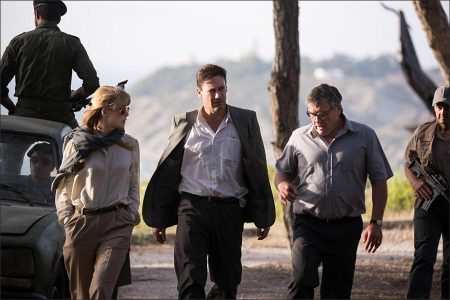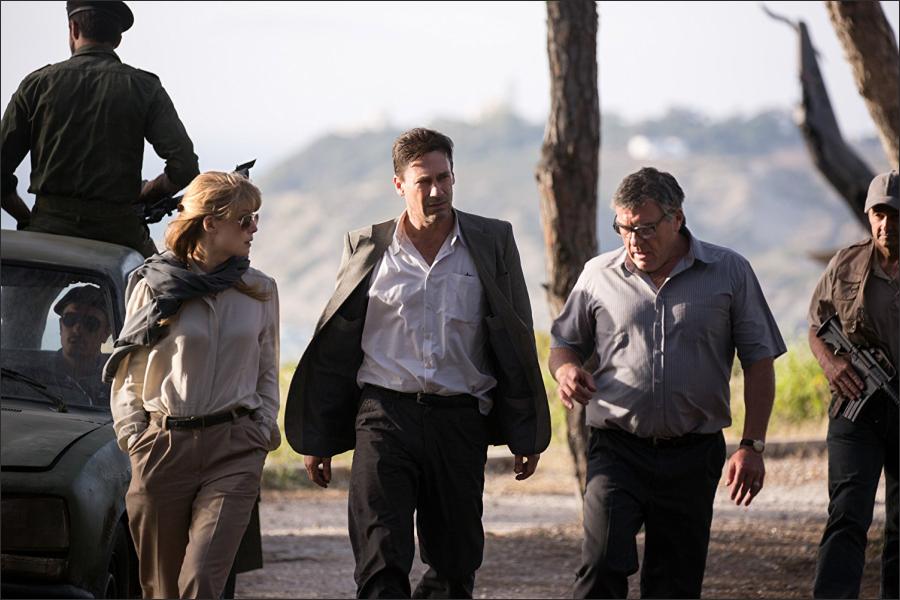Beirut Movie Storyline. In 1972, Mason Skiles (Jon Hamm) is a U.S. diplomat living the good life in Beirut with his wife Nadia (Leila Bekhti). They have no children of their own, as yet, but treat 13-year-old orphan refugee Karim (Yoav Sadian Rosenberg) as “part of the family.” During a posh cocktail party, however, uninvited guests bring unwelcome news: Not quite so alone in the world as he’d pretended, little Karim has an older brother, and he’s no less than Abu Rajal (Hicham Ouraqa), a notorious Palestinian terrorist linked to the recent Summer Olympics massacre in Munich as well as other attacks.
Mason is trying to prevent the boy being dragged off for interrogation by Mossad agents when the party is scattered by gunfire: The elusive brother has turned up to nab his sibling before the Israelis do. An ensuing skirmish has tragic consequences for Mason, whom we next see 10 years later working as a labor-dispute mediator in Boston, completely cut off from his high-flying past. But that past surfaces unexpectedly when a distant acquaintance finds him drinking (as usual) in a bar. He’s offered thousands to immediately get on a flight to Beirut — the place he never wanted to see again — ostensibly in order to lecture at a university. He only consents because it’s clear the real reason is some matter of pressing importance, and “the Agency” won’t take no for an answer.
He arrives well-lubricated to find the city he loved now in ruins after years of civil war. His designated minder, cultural attaché Sandy Crowder (Pike), immediately turns him over to a trio of CIA, embassy, and State Department officials (played Dean Norris, Shea Whigham, and Larry Pine) who reveal they’re dealing with a hostage situation: CIA agent Cal Riley (Mark Pellegrino), the onetime best friend Mason hasn’t spoken to in a decade, has been kidnapped.
Why the perps specifically requested Skiles as negotiator soon becomes clear. Their leader is a now-grown Karim (Idir Chender), who trusts his former benefactor can broker an exchange for the release of the brother he believes is in secret Israeli custody, for what’s by now a very long list of pro-Palestinian terroristic acts. But the Israelis (repped by Alan Aboutboul’s military bulldog) claim they don’t have him, and probably wouldn’t give him up if they did. On the other side, the local PLO minister (Ahmed Said Arie) has his own personal and political hidden agendas — as do even the Yanks present, with their competing departmental priorities and careerist schemes.
Realizing he’s perhaps the only person here who really cares about saving Cal, Mason keeps giving Sandy et al. the slip to operate freely in his friend’s best interest. Eventually, however, he discovers Sandy is an ally, and they’re both willing to “go rogue” if necessary.
Beirut (formerly titled High Wire Act) is a fictional[1] political thriller film directed by Brad Anderson. The film’s trailer drew criticism from the public and Internet backlash, including calls to boycott over discrimination. The film premiered at the 2018 Sundance Festival, receiving a mixed critical response along with criticism for being xenophobic and reductive of Lebanese history. Bleecker Street will release the film on April 13, 2018.
Film Review for Beirut
n an unexpected twist, Sundance has become the launch pad for what 20 years ago was very mainstream fodder: the mid-budget, fairly smart international spy film. We saw it in 2014 with Philip Seymour Hoffman starring in the adaptation of John le Carré’s A Most Wanted Man, and we have it again this year with Beirut, which, when it is working well, is of Le Carré caliber. This isn’t a particularly chancy film, unless the decision to go old school is considered such. It is still, however, quite good.
We open in 1972 where Jon Hamm’s foreign diplomat Mason Skiles (what a name!) is friendly to all sides in Beirut. It’s quickly evident that his dominant skill isn’t fighting or shooting, it’s talking. Problems arise in the middle of a cocktail party when agents realize that his 13-year-old ward Karim is actually the younger brother of a terrorist wanted for the Munich Olympics attack. Just as the CIA wants to grab him, the older brother’s goons burst in, bullets fly and Skiles’ wife is dead.
Ten years later and the warm umber tones of Beirut are traded for the cold gray skies of Boston. Skiles, drinking a lot, is a low-level mediator for labor disputes (whomever director Brad Anderson cast as the sick-of-it-all shop steward is perfect) until he gets an urgent request to “come speak at a university in Beirut”. He knows that something big has gone south if he’s the only guy who can fix it. He gets himself loaded and gets on a plane.
Beirut in 1982 is divided into factions and on the brink of all-out chaos. (Though a specific date isn’t given, this story is set before that year’s massacre at the Sabra and Shatila refugee camps, and the bombing of the US barracks is still a year away.) Tony Gilroy’s sharp script tips just enough of the “who is fighting who” in a short, witty rant from a taxi driver explaining why they are taking the scenic route. Wisely, a jaundiced eye is cast on all players: the Christian and Muslim factions, the PLO and the neighboring Israelis.
Today’s specific crisis is this: one of Skiles’ old buddies Cal (Mark Pellegrino) has been kidnapped, and he must be found at once or else all his intel will be blown. It’s a fringe group that has him, and they will only speak to Skiles. Turns out it’s grownup Karim (Idir Chender) and he’s convinced the Israelis are holding his older brother after a decade of successful terrorist attacks. The clock is now ticking: find the brother, get your man back.
A specific negotiating task to Skiles is like spinach to Popeye. He shakes off his drunken stupor and starts calling out plays like an American football coach. Gilroy’s dialogue is sharp, but he doesn’t push it (not everyone must be a showoff like Aaron Sorkin.) What follows is essentially a string of meetings until the final handoff can happen.
Like any good spy tale, there’s the wounded man in the center, and Hamm (mostly bouncing off his CIA handler Rosamund Pike) has got the hollow hero thing down after seven seasons of Mad Men. It may sound like a low bar, but the non-plot bits in this movie aren’t a bore, which if you’ve seen a direct-to-video John Cusack or Nicolas Cage spy movie recently, you know isn’t always the case.
The conclusion’s big twist isn’t quite as sexy as it thinks it is, though one instantly forgives it for the outstanding needle-drop chosen for the final scenes. I have no doubt that we’ll see essays from both Israelis and Palestinians denouncing this film, as well as Lebanese critics decrying the use of their country’s bloody recent history as a backdrop for mere Hollywood spectacle. I don’t really have a defense for that last one, especially since the people of Lebanon barely feature in the movie at all. Perhaps this is commentary on American tunnel vision in foreign policy, or perhaps this is just a tightly focused narrative on a deadline. Or maybe as with so many things, there’s some truth on both sides.
Beirut (2018)
Directed by: Brad Anderson
Starring: Rosamund Pike, Jon Hamm, Dean Norris, Douglas Hodge, Mark Pellegrino, Shea Whigham, Jonny Coyne, Kate Fleetwood, Leïla Bekhti, Alon Aboutboul, Sonia Okacha, Mohamed Attougui
Screenplay by: Tony Gilroy
Production Design by: Arad Sawat
Cinematography by: Björn Charpentier
Film Editing by: Andrew Hafitz
Costume Design by: Carlos Rosario
Set Decoration by: Felicity Good, Mohamed Rakaa, Amin Rharda
Art Direction by: Ian Bailie, Teddy Setiawan
Music by: John Debney
MPAA Rating: R for language, some violence and a brief nude image.
Distributed by: Bleecker Street
Release Date: April 13, 2018
Views: 172










